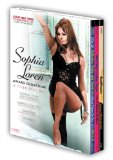| Reviews & Columns |
|
Reviews DVD TV on DVD Blu-ray 4K UHD International DVDs In Theaters Reviews by Studio Video Games Features Collector Series DVDs Easter Egg Database Interviews DVD Talk Radio Feature Articles Columns Anime Talk DVD Savant Horror DVDs The M.O.D. Squad Art House HD Talk Silent DVD
|
DVD Talk Forum |
|
|
| Resources |
|
DVD Price Search Customer Service #'s RCE Info Links |
|
Columns
|
|
|
Sophia Loren: Award Collection
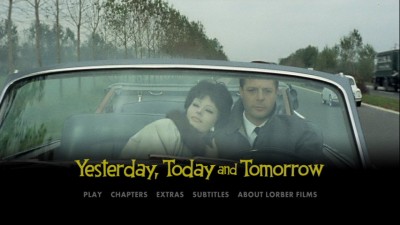
Yesterday, Today, and Tomorrow tells three separate stories, each playing as though a short film, and none relating directly to one another. The idea is surely that one represents each time frame as the title indicates but the correlation seems somewhat thin. It doesn't matter. These are engaging stories and well worth being bundled together in this quirkily delightful film. Each story takes place in a different part of Italy with some strikingly varied characters portrayed by Loren and Mastroianni. The first story is entitled Adelina and is set in Naples. It centers on a poor couple, faced with a growing debt, who decide to resort to continual pregnancy in order to work through a loop-hole that prevents Adelina (Loren's character) from heading to jail. The second story is entitled Anna, and it is the shortest of the three pieces but perhaps the most humorous by taking an examination of the two characters who seem to contemplate having an affair with one another -- but are perhaps not right for each other in many ways. The last piece, entitled Maria, has Loren portraying a prostitute who serves many clients. Maria encounters a young gentleman staying with her neighbors and he is also a priest. The pair exchange some glances and conversation before the priest begins to decide to change his life's path, and Maria must help convince him to return to priesthood with the help of one of her most eccentric and frequent clients, named Augusto (Mastroianni).
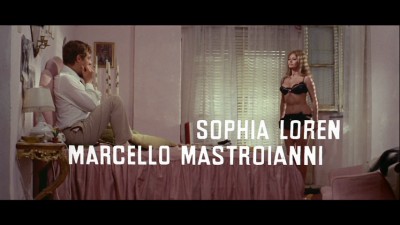
Mastroianni is just as important to the film. He manages to bring a unique comic sensibility to each role in the film, and does so in a way that feels exaggerated but finely spirited with each individual segment. Here was an actor just as fantastic as Loren, and who knew almost instinctively how to perform well with her on screen. With both performers in the same film it was almost assuredly going to be a worthwhile experience for movie-goers. Mastroianni is in a special league of actors who can portray deep humor and deep realism in characters at once.
The direction by De Sica is superb throughout the entire motion-picture. It is not surprising that Yesterday, Today, and Tomorrow took home the prestigious Academy Award for Best Foreign Language Film in 1964. The film makes a perfect argument for his abilities as a filmmaker -- through pulling excellent performances out his actors and making them as varied as they can be in such a project. He also managed to tell each story with different graces. There are so many compilation films produced which attempt to blend short stories together into a cohesive experience. Most of the time audiences are left with some sense of disappointment as there usually isn't a true cohesion to the work. De Sica was wise to direct this entire film. The final product argues on behalf of his gifts from one frame to the next, and never falters in entertaining with rich humanism and a deep instinctual understanding of storytelling.
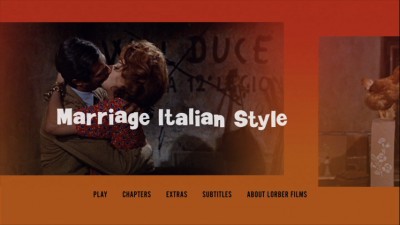
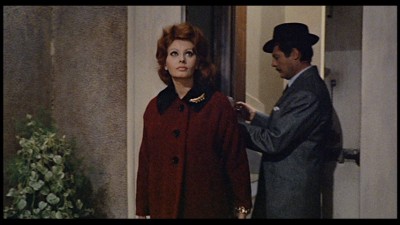
Marriage Italian Style introduces us to a cold-hearted man by the name of Domenico (Mastroianni), someone who indulges in his sexual appetites, and seems to care less passionately for a woman by the name of Filumena (Loren) who shows the compassion for him that is lacking from Domenico in return. The story focuses on the relationship of these two characters over a period of many years -- from Filumena's youthful age when she was working as a prostitute to when she was older, wiser, and indeed filled with sadness from Domenico's unloving ways.
The characters Sophia Loren and Marcello Mastroianni perform as in this story are very different from anything experienced in Yesterday, Today, and Tomorrow. The pair worked together on so many different projects though that it would be natural for them to want to continue that tradition while performing with a wide range of characteristics. Mastroianni excels at playing an almost completely unlikeable character here. The character Domenico treats Filumena horribly in so many segments of the film that it becomes a hardship just to witness some of the events that occur to the more sympathetic leading lady in the tangled relationship of this on-screen romance of the saddest proportions.
De Sica uses the time distances of the story to great effect. Over the course of the film audiences are witness to so many costume changes, differences in make-up, and indeed range in performances that must convey the differences in the characters over quite long periods of time. This could completely misfire and ruin an experience for audiences but the effects of the production are as absorbing as the performances that it only enhances the film.
The character of Domenico is such a vulgar one in a lot of ways, and perhaps less humorous and more disturbing when the film is viewed today. The film focuses so much on a tragic story, but it is told with some genuinely humorous elements that are mingled completely with sadness. While the moments of humor are played to perfection they also demonstrate a deeper tragedy behind the character relationships that is relevant to the overall important of the film and the commentary it displays on the often twisted relationships between men and women. In some ways, the film seems ahead of the times by addressing societal issues between viewpoints on relationships. Ultimately, this sweeping drama doesn't seem to want to allow audiences to connect with Domenico the same way Filumena can be related to and respected. The film is quite the epic and one that will pull viewers through many emotions.
The music from frequent De Sica collaborator Armando Trovaioli was wonderful in its complimentary style. The score frequently manages to enhance scenes throughout, and works on several levels. It can create a greater sense of the locations and also of the central focus of the scenes portrayals of emotion as brought to life by the actors.
Marriage Italian Style is a wonderfully made film and it deserved the recognition it received upon its release. While the film was nominated (but failed to win) the Academy Award for Best Foreign Language Film or the Best Actress award, this is still absolutely incredible as a must-see film. The filmmaking holds up extremely well and is worth repeated viewings for true cinema aficionados.
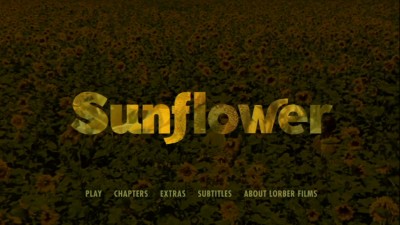
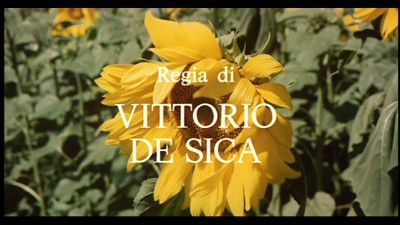
Sunflower is about the unbreakable bonds of love and how that can impact us even when separated by circumstances that are beyond our control. The story focuses itself around Giovanna (Loren), as a passionate woman who searches for her missing and potentially dead husband Antonio (Mastroianni), who was last seen in Russia during WWII. Giovanna hasn't given up hope that her husband could be alive and sets out on a quest across the lands affected by the horrors of war to find her husband, whom she so clearly loves and longs to be reunited with no matter the cost.
The film could be described as a melodrama, and yet it never reaches into a territory that would seem to lack in the genuineness that is sometimes overlooked in many melodramas. The focus of the film creates a heightened sense of emotion more so than any of the other three De Sica collaborations presented with new Kino Lorber releases, and in that sense this is a pure melodrama. So be it! This is a wonderful film that manages to be one of the most heartfelt stories brought to life by De Sica, Loren, and Mastroianni. There was an emphasis placed on crafting a genuinely romantic and involving epic that would draw emotions above all other elements. Some of the finest performances in any De Sica film are on display with this effort. Sunflower is the kind of finely realized romance that should bring countless men and women into tears because of the honesty felt in the acting, direction, and emphasized by a wonderful score.
The score to Sunflower was composed by master composer Henry Mancini. It is one of his most overlooked and underappreciated efforts on any film. While it was recognized at the time of the film's release with award nominations it has become somewhat obscure in comparison to many of his other efforts. This is an unfortunate realization that fails to reflect the high quality of the music.
This was an early film to allow the filmmakers to actually film in the USSR. It provides viewers with some outstanding images to behold and remember. The cinematography by Giuseppe Rotunno brings the images in the film to a sense of life and the visual excellence of the film seems even more effective than Rotunno's work was in capturing Naples, Milan, and Rome for De Sica's Yesterday, Today, and Tomorrow (which was also an example of excellence in cinematography).
Sunflower may actually be the best film in this collection. It certainly stands a fair shot at holding the title for those who favor pure romance over the humor found more abundantly in Marriage Italian Style and Yesterday, Today, and Tomorrow. Much like Henry Mancini's overlooked and underappreciated score, Sunflower is one of the best De Sica films and it deserves more respect as a classic example of the gifted film-maker's greatest qualities.
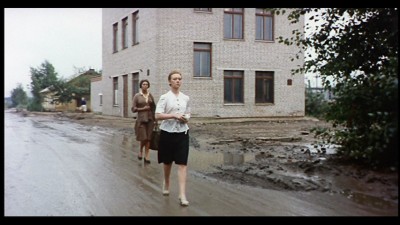
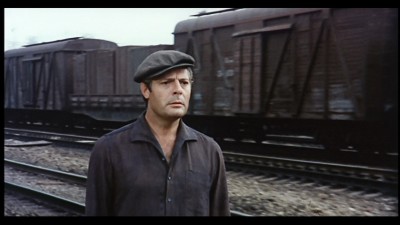
Taken as a whole, the Sophia Loren Award Collection offers some wonderful experiences with great cinematic treasures worth remembering. There is the unfortunate truth that one of Loren's greatest collaborations with De Sica isn't included on this set (the powerful Two Women). Two Women is still without a decent DVD release in North America. One might hope that Kino or Criterion would bring that classic film to new audiences (many of whom may need to actually discover that gem still). The three films found on this release are uniformly excellent and stand together as a strong representation for Loren, Mastroianni, and Vittorio De Sica as some of the finest voices in Italian cinema.
The DVD:
Packaging:
The set contains three individual clear slim-cases inside of a somewhat sturdy cardboard box housing the films. The front of the box contains a seductively posed Sophia Loren from one of the more famous scenes in Yesterday, Today, and Tomorrow. The individual cases contain versions of theatrical posters for the three films and are nicely illustrated covers. There is one major complaint I have against the packaging, and that is how it's unfairly called the Sophia Loren Award Collection. Considering the fact that all three films in the set also starred Marcello Mastroianni and each film was directed by the acclaimed Vittorio De Sica... let's just say it seemed a bit wrong to only highlight Sophia Loren's involvement.
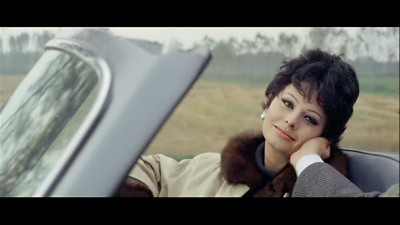
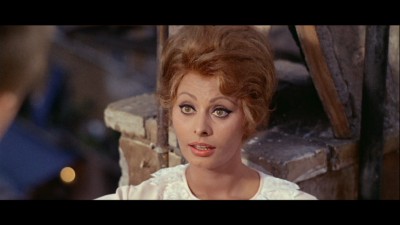
Video:
The Sophia Loren Award Collection (containing Sunflower, Marriage Italian Style, and Yesterday, Today, and Tomorrow) arrives on DVD with acceptable (if underwhelming) results. Each film is presented in the original theatrical aspect ratio with anamorphic widescreen enhancement (Sunflower is presented in 1:85:1, Marriage Italian Style is presented in 1:85:1, and Yesterday, Today, and Tomorrow is presented in 2:35:1).
There have been many subpar bootleg and cheap-o label releases for these films and it's gotten a bit out of hand. Far too many times have these films received poor treatments in the video department. These prints are superior to most other editions, and may be the best seen stateside to date, but they are not without some distracting and disappointing video flaws. Marriage Italian Style and Sunflower would both rate as 3.0/5.0 with transfers that have subdued color reproduction, grain left intact (though sometimes the grain appears to be reproduced at distracting levels), with both prints lacking any significant print damage but the occasional specks of dirt and debris do show up. These could look somewhat better and yet these are still stronger prints than previously made available for long neglected films.
Yesterday, Today, and Tomorrow is the weakest transfer of the set. It would rate only as a 2.0/5.0. The film has the same qualities that make the other films in the set acceptable if somewhat underwhelming, yet there also appears to be some kind of video issue that may have resulted from some poor compression. The speed of the video often felt slowed down -- so much so in some scenes that I felt it wasn't the proper frame rate. Scenes focused on the intense human drama of the film were affected less by this issue, but it did become quite noticeable throughout scenes where there was more movement. This transfer was the biggest disappointment of the set. It was encoded with a low bitrate, which likely affected the PQ the most, and it pales in comparison to the transfers provided for the other two films. What makes matters even worse is that a trailer for Yesterday, Today, and Tomorrow is included on the same DVD and it has better colors, less distracting film grain (without appearing particularly scrubbed by DNR), and no issue with the speed of the film. The theatrical trailer was even encoded with a significantly higher bitrate. Unfortunately, I haven't seen the NoShame DVD release of Yesterday, Today, and Tomorrow which was generally well regarded so I cannot compare.
Considering the fact that the set proclaims these are "All New HD Transfers" I expected more from the presentations and was disappointed, but still pleased knowing that these films are at least presentable compared to the frequently disastrous results for these particular productions. Blu-ray owners might be wise to wait and see if the upcoming releases on the High Definition format fare better than what is found on this release.
In comparing the Sunflower DVD included in this set to the copy that is included in the Studio Canal Sophia Loren set, I found that the transfer on the Canal release is not as presentable as what is found on this Kino Lorber release (even if only by a small margin).
Audio:
Audio is limited to 1.0 Mono. The key to this aspect is that it sounds authentic and true to the source on each film. The audio is somewhat impressive for films that have often been neglected in that department. This collection features original Italian audio and optional English subtitles. Many past DVD editions for these films have neglected to include the original audio and it is wonderful to have a set that seems to contain exactly what fans would want to receive with this aspect of the release. The dialogue comes through clearly and the music manages to hold some weight despite the age of these films. There are no cracks or hiss moments that I could tell (though the included theatrical trailers for Marriage Italian Style and Sunflower were prone to this). To my ears, these films seem to have faithful and proper audio. The subtitles are easy to read with no noticeable issues with spelling or grammar errors.
In comparing the Sunflower DVD included in this set to the copy that is included in the Studio Canal Sophia Loren set, I found that the 2.0 audio on the Canal release actually sounded weaker and less balanced.
Extras:
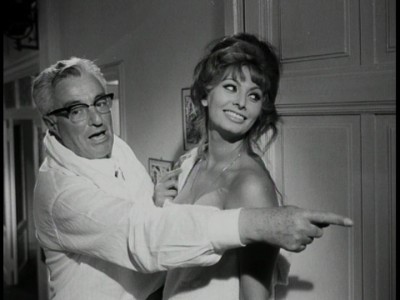
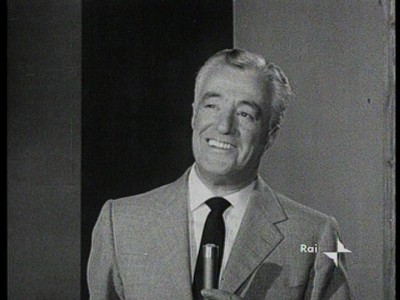
There isn't a lot of content in the way of extras. There are three theatrical trailers (one for each film), and a theatrical promotional reel for Marriage Italian Style that runs a bit longer than usual and features clips of audiences sharing their opinions on Sophia/Marcello/Vittorio collaborations. I have decided to write my thoughts on the included documentary (housed in the same case for Yesterday, Today, and Tomorrow) in this section.
Vittorio D. is a somewhat entertaining and informative feature length documentary film about the man who directed the three features included on this box-set, Vittorio De Sica. This visionary filmmaker is responsible for many of the greatest films ever made. In addition to crafting these rather fine collaborations with Sophia Loren and Marcello Mastroianni he also made the classics Bicycle Thieves, The Garden of the Finzi-Continis, and Umberto D. among others.
The documentary features short interview clips with many artists who were inspired by or moved by his work. Woody Allen, Clint Eastwood, and several other famous individuals are interviewed to find their insight into the director's filmmaking qualities and personal life. It was particularly interesting to hear from family members of De Sica (such as his children). The film explores his early career before becoming a popular director, his serious addiction to gambling, the relationships he had with women (and his children - who are interviewed on the set), and also on the later-career focus on acting that was particularly meaningful to De Sica. This documentary wasn't quite as comprehensive as what I would have liked to see. I yearned for more information about his approach to filmmaking. Still, this was an informative and noteworthy film just the same that succeeded at bringing some added insight into the man behind the scenes of these beloved classic films.
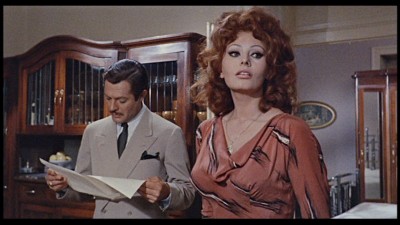
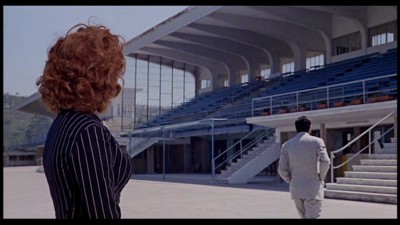
Final Thoughts:
This is an excellent set and it is well worth owning considering the high quality of the films themselves. The Sophia Loren Award Collection contains three masterpieces directed by Vittorio De Sica and a pretty decent documentary about the director who brought these stories to life. The PQ/AQ on each film doesn't reach perfection but these are still better prints and more faithful audio reproductions than found on other home media releases. Serious fans of Sophia Loren, Marcello Mastroianni, and Vittorio De Sica will be generally pleased by the results and should consider this a worthwhile purchase (unless said fans have a Blu-ray player and would rather opt for the individually released High Definition releases). This will be an essential collection for many film fans. Highly Recommended.
Neil Lumbard is a lifelong fan of cinema. He aspires to make movies and has written two screenplays on spec. He loves writing, and currently does in Texas.
|
| Popular Reviews |
| Sponsored Links |
|
|
| Sponsored Links |
|
|
| Release List | Reviews | Shop | Newsletter | Forum | DVD Giveaways | Blu-Ray | Advertise |
|
Copyright 2024 DVDTalk.com All Rights Reserved. Legal Info, Privacy Policy, Terms of Use,
Manage Preferences,
Your Privacy Choices | |||||||









